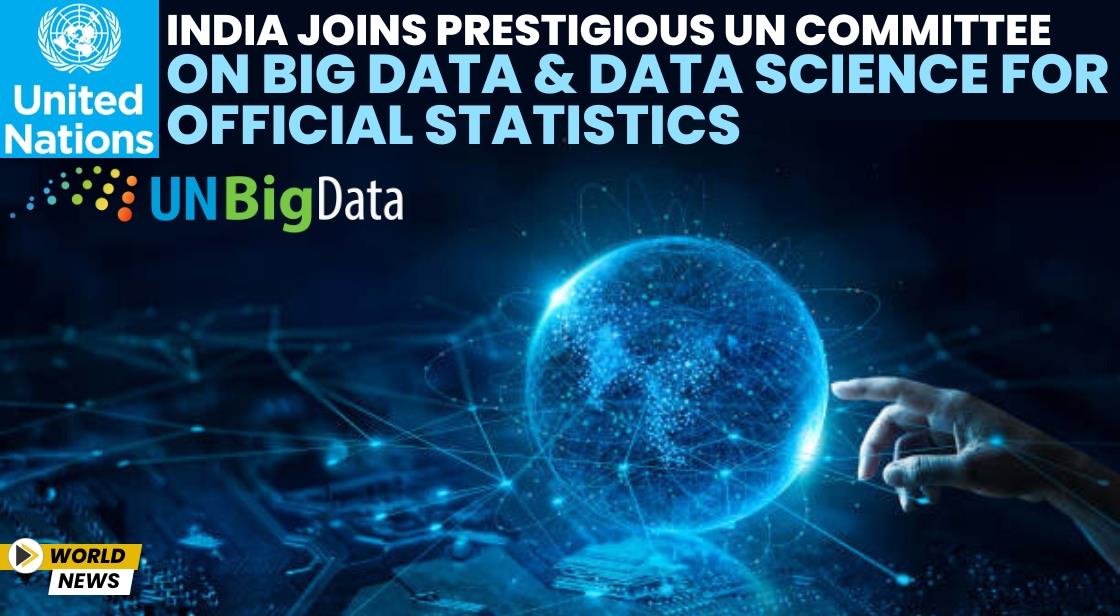India Joins Prestigious UN Committee on Big Data and Data Science for Official Statistics

News Synopsis
India has achieved a significant milestone by joining the UN Committee of Experts on Big Data and Data Science for Official Statistics (UN-CEBD). This development marks an important step toward leveraging cutting-edge data science and big data technologies for advancing global statistical practices, particularly in monitoring and reporting on Sustainable Development Goals (SDGs).
"The inclusion in this expert committee comes at a pivotal time, as India recently assumed membership of the United Nations Statistical Council after a significant gap," the Ministry of Statistics stated on Saturday.
Strengthening India’s Statistical Ecosystem
India's inclusion in the UN Committee of Experts on Big Data and Data Science for Official Statistics (UN-CEBD) highlights the nation’s growing prominence in the global statistical community. By joining this esteemed committee, India is positioned to play a key role in shaping global standards for utilizing big data and data science in official statistics.
The Ministry of Statistics emphasized:
“India’s inclusion in the Committee of Experts represents a significant leap forward for the country’s statistical ecosystem.”
Key Contributions and Innovations
India’s active participation will showcase its innovative initiatives, such as:
-
The establishment of the Data Innovation Lab.
-
The adoption of alternate data sources, including satellite imagery and machine learning, for policymaking.
These advancements demonstrate India’s commitment to integrating modern technologies into its statistical processes, aligning with global goals while addressing domestic socio-economic challenges.
Transforming Official Statistics with Big Data
Big data and advanced data science techniques offer transformative potential for the field of official statistics. India aims to modernize its statistical ecosystem by:
-
Utilizing non-traditional data sources, such as IoT devices, satellite imagery, and private sector data streams.
-
Reducing time lags in data availability to provide real-time insights for evidence-based policymaking.
This approach will enhance the accuracy and timeliness of data dissemination, enabling better governance and effective policy formulation.
Global Collaboration and Knowledge Sharing
India’s membership in the committee fosters international collaboration, allowing the country to share its expertise while learning from global best practices. This exchange of knowledge will help create robust and future-ready statistical frameworks.
“Membership in the Committee of Experts is a strategic opportunity for India to align its domestic advancements in big data and data science with international goals, showcasing the country’s capability to lead transformative initiatives in the data domain,” the Ministry added.
India’s Role in Building a Resilient, Data-Driven Future
By joining the UN-CEBD, India has taken a critical step toward revolutionizing statistical production and dissemination, ultimately contributing to a resilient and data-informed world. This engagement solidifies India’s commitment to data-driven progress and underscores its capability to influence global statistical practices for sustainable development.
Conclusion
India's inclusion in the UN Committee of Experts on Big Data and Data Science for Official Statistics (UN-CEBD) is a landmark achievement that underscores the country’s growing influence in the global statistical community. This membership highlights India’s commitment to integrating cutting-edge technologies like big data, machine learning, and satellite imagery into its statistical ecosystem, paving the way for more accurate, real-time data insights.
By sharing its pioneering initiatives, such as the establishment of the Data Innovation Lab, India is set to contribute significantly to shaping global standards for statistical practices.
This strategic opportunity allows India to align its domestic advancements with international goals, further enhancing its role in driving sustainable development. Additionally, it strengthens the global exchange of knowledge and fosters innovation in statistical processes. As India takes this significant step forward, it positions itself as a global leader in leveraging data and technology for informed policymaking and governance.









